visual
location
Contents
환경경영 - 지속가능 시스템
국내외 환경 규제 대응
섬유 업계는 현지 국가별 환경관련 규제 뿐 아니라 Product safety 관련 RSL (Restricted Substance List)을 준수하기 위해 원부자재의 생산 및 납품에서 봉제, 포장까지 전 공정에 있어 운영관리와 검사를 강화하고 있습니다.
- 국내외 Product Safety 관련 규제 대응
- 미국 연방법인 CPSIA(Consumer Product Safety Improvement Act), 워싱턴 주립 법 CSPA (Children's Safe Products Act)와 California Proposition 65 등 북미의 규제들과 유럽의 REACH, 중국의 china GB 등 각국의 제품관련 물질규제는 경쟁적으로 높아져 가고 있습니다. 이와 함께 봉제공장 생산라인의 Sustainability 환경 지수를 진단하는 HIGG Index와 MQP(Mill Quality Program), TQP(Trim Supplier Quality Program), 분쟁광물보고(Conflict Minerals) 등 바이어의 제품 물질 안전 규제 요구사항도 복잡하게 강화되고 있습니다. 세아상역㈜은 모든 제품관련 물질안전 규제에 선 대응하고 바이어의 신뢰를 충족하기 위해 각 규제에 맞는 자체 프로세스와 매뉴얼을 구축하여 관리하고 있습니다.
- 세아상역에서는 미국 금융규제법안(Dodd-frank Wall Street Reform and Consumer Protection 법안) 대응의 일환으로 분쟁광물(Conflict Minerals_콩고 및 주변 9개 분쟁지역에서 생산되는 탄탈륨, 텅스텐, 주석, 금) 방침을 구축하였습니다. 자세한 내용은 하기 ‘분쟁광물 Policy’버튼을 클릭하여 확인해 주십시오.
SAE-A Trading Co., Ltd. STATEMENT ON CONFLICT MINERALS
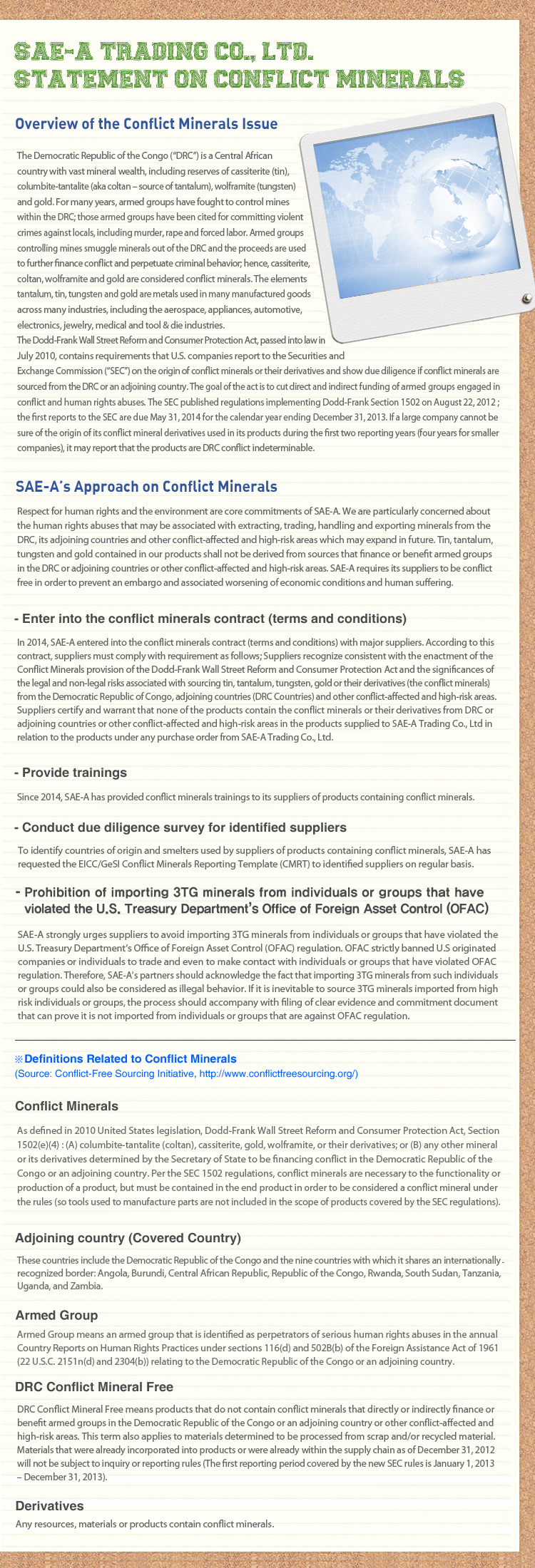
Overview of the Conflict Minerals Issue
The Democratic Republic of the Congo (“DRC”) is a Central African country with vast mineral wealth, including reserves of cassiterite (tin), columbite-tantalite (aka coltan – source of tantalum), wolframite (tungsten) and gold. For many years, armed groups have fought to control mines within the DRC; those armed groups have been cited for committing violent crimes against locals, including murder, rape and forced labor. Armed groups controlling mines smuggle minerals out of the DRC and the proceeds are used to further finance conflict and perpetuate criminal behavior; hence, cassiterite, coltan, wolframite and gold are considered conflict minerals.The elements tantalum, tin, tungsten and gold are metals used in many manufactured goods across many industries, including the aerospace, appliances, automotive, electronics, jewelry, medical and tool & die industries. The Dodd-Frank Wall Street Reform and Consumer Protection Act, passed into law in July 2010, contains requirements that U.S. companies report to the Securities and Exchange Commission (“SEC”) on the origin of conflict minerals or their derivatives and show due diligence if conflict minerals are sourced from the DRC or an adjoining country. The goal of the act is to cut direct and indirect funding of armed groups engaged in conflict and human rights abuses.The SEC published regulations implementing Dodd-Frank Section 1502 on August 22, 2012; the first reports to the SEC are due May 31, 2014 for the calendar year ending December 31, 2013. If a large company cannot be sure of the origin of its conflict mineral derivatives used in its products during the first two reporting years (four years for smaller companies), it may report that the products are DRC conflict indeterminable.
SAE-A’s Approach on Conflict Minerals
Respect for human rights and the environment are core commitments of SAE-A. We are particularly concerned about the human rights abuses that may be associated with extracting, trading, handling and exporting minerals from the DRC and adjoining countries. Tin, tantalum, tungsten and gold contained in our products shall not be derived from sources that finance or benefit armed groups in the DRC or adjoining countries. SAE-A requires its suppliers to be DRC conflict free in order to prevent an embargo and associated worsening of economic conditions and human suffering.
- - Enter into the conflict minerals contract (terms and conditions) In 2014, SAE-A entered into the conflict minerals contract (terms and conditions) with major suppliers. According to this contract, suppliers must comply with requirement as follows; Suppliers recognize consistent with the enactment of the Conflict Minerals provision of the Dodd-Frank Wall Street Reform and Consumer Protection Act and the significances of the legal and non-legal risks associated with sourcing tin, tantalum, tungsten, gold or their derivatives (the conflict minerals) from the Democratic Republic of Congo and adjoining countries (DRC Countries). Suppliers certify and warrant that none of the products contain the conflict minerals or their derivatives from DRC countries or adjoining countries in the products supplied to SAE-A Trading Co., Ltd in relation to the products under any purchase order from SAE-A Trading Co., Ltd.
- - Provide trainings Since 2014, SAE-A has provided conflict minerals trainings to its suppliers of products containing conflict minerals.
- - Conduct due diligence survey for identified suppliers To identify countries of origin and smeltersused by suppliers of products containing conflict minerals, SAE-A has requested the EICC/GeSI Conflict Minerals Reporting Template (CMRT) to identified suppliers on regular basis.
※Definitions Related to Conflict Minerals (Source: Conflict-Free Sourcing Initiative, http://www.conflictfreesourcing.org/)
Conflict Mine rals
As defined in 2010 United States legislation, Dodd-Frank Wall Street Reform and Consumer Protection Act, Section 1502(e)(4): (A) columbite-tantalite (coltan), cassiterite, gold, wolframite, or their derivatives; or (B) any other mineral or its derivatives determined by the Secretary of State to be financing conflict in the Democratic Republic of the Congo or an adjoining country. Per the SEC 1502 regulations, conflict minerals are necessary to the functionality or production of a product, but must be contained in the end product in order to be considered a conflict mineral under the rules (so tools used to manufacture parts are not included in the scope of products covered by the SEC regulations).
Adjoining country (Covered Country)
These countries include the Democratic Republic of the Congo and the nine countries with which it shares an internationally recognized border: Angola, Burundi, Central African Republic, Republic of the Congo, Rwanda, South Sudan, Tanzania, Uganda, and Zambia.
Armed Group
Armed Group means an armed group that is identified as perpetrators of serious human rights abuses in the annual Country Reports on Human Rights Practices under sections 116(d) and 502B(b) of the Foreign Assistance Act of 1961 (22 U.S.C. 2151n(d) and 2304(b)) relating to the Democratic Republic of the Congo or an adjoining country.
DRC Conflict Mineral Free
DRC Conflict Mineral Free means products that do not contain conflict minerals that directly or indirectly finance or benefit armed groups in the Democratic Republic of the Congo or an adjoining country. This term also applies to materials determined to be processed from scrap and/or recycled material. Materials that were already incorporated into products or were already within the supply chain as of December 31, 2012 will not be subject to inquiry or reporting rules (The first reporting period covered by the new SEC rules is January 1, 2013 – December 31, 2013).
Derivatives
Any resources, materials or products contain conflict minerals
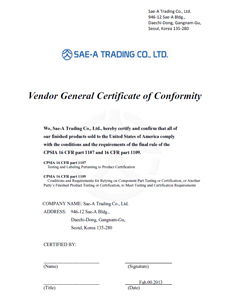 세아상역㈜ CPSIA 대응양식
세아상역㈜ CPSIA 대응양식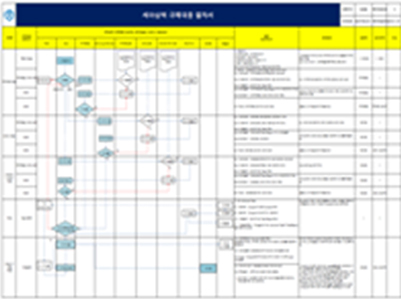 세아상역㈜ CPSIA 대응 프로세스 절차서
세아상역㈜ CPSIA 대응 프로세스 절차서- 세아 규제 대응 IT System
- 세아상역㈜은 2013년 강화된 CPSIA(Consumer Product Safety Improvement Act)를 협력업체와 보다 효율적으로 대응하기 위하여 CPSIA 대응 IT 프로세스를 세아 SCM 사이트에 구축하고 ERP 시스템에 연동하여 체계적인 스마트 관리를 실현하고 있습니다. 규제 대응 IT 시스템을 통하여 관련 문서의 장기간 보관은 물론 검색과 보고에 효율성을 높여 규제관련 정보화 속도를 높이고 있습니다.
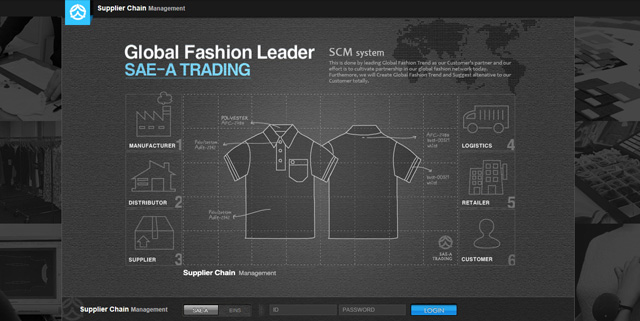
환경전문가 양성을 위한 내 외부 역량 교육
나날이 복잡하게 강화되어 가는 환경규제 뿐만 아니라 기후변화, EMS 관리메뉴얼 등 환경과 관련된 다양한 정보를 직급과 대상에 맞게 교육시키는 것은 모든 기업에게 당면한 어려운 과제 입니다. 세아상역㈜은 내부 임직원과 외부 협력업체로 대상을 구분하여 각 직급에 맞는 교안과 강사를 섭외하여 환경교육을 진행해 왔습니다. 내부적으로는 국내외 임직원, 임원진, 신입사원을 직급별로 구분하여 환경관련 교육 및 Sustainability동향을 교육하고 있습니다. 특히, 세아상역㈜은 해외 협력업체가 빠르게 변화하는 경영환경에 적정하게 대응할 수 있도록 주기적으로 정보를 제공하고 요청 시에는 직접 현지 공장을 방문하여 해결방안을 협의하고 있습니다. 향후에는 해외법인도 교육영역과 대상을 확장하여 현지인 관리자와 생산라인 직원도 니즈에 따라 참가할 수 있는 교육 프로그램을 순차적으로 진행할 예정입니다.
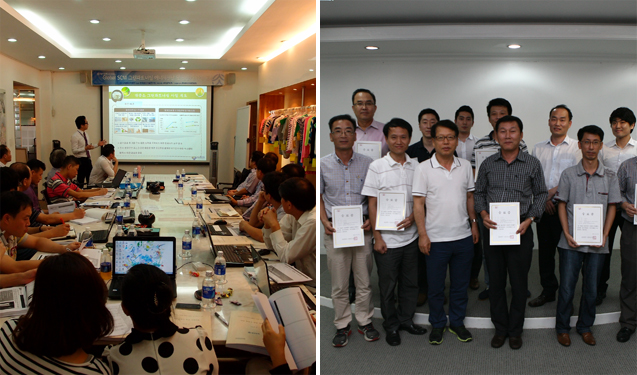
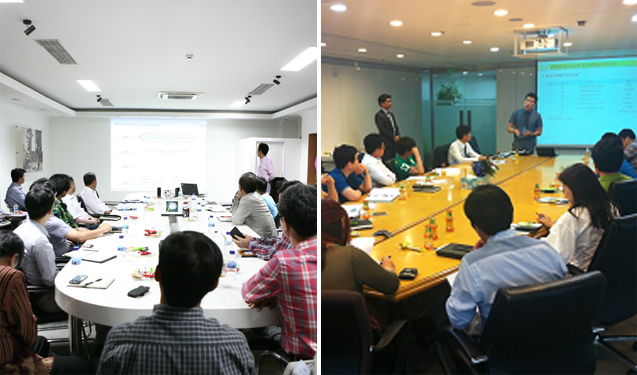
지속가능 상생경영 – 에코파트너십 체결
2013년 세아상역㈜은 국내외 주요 협력업체들과 에코 파트너십(Eco-partnership) 협약을 체결하고 본격적인 '상생경영'의 해를 선언하였습니다. 세아상역㈜ 에코 파트너십은 환경경영 시스템과 국내외 각종 환경규제 대응 프로세스 구축 등 지속가능 경영이슈에 적극적으로 대응해 나가기 위해 양측이 긴밀히 협력하겠다는 서약입니다. 에코 파트너십에 참여한 협력업체는 세아상역㈜과 환경 컨설팅업체의 환경진단 및 솔루션 컨설팅을 받으며 개선 요구 사항에 대한 보완을 순차적으로 강화해 나가고 있습니다.
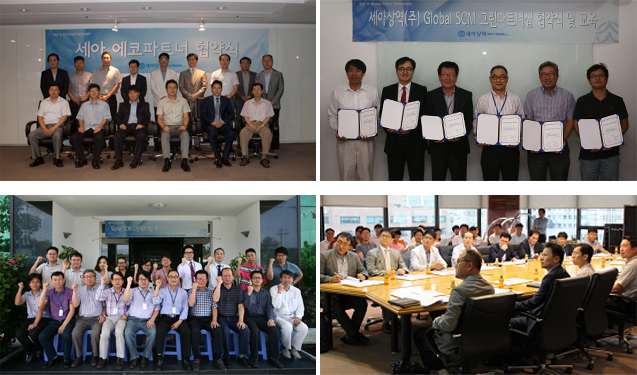
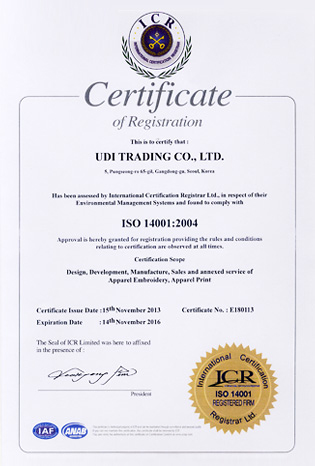 세아 우수 에코파트너 업체의
세아 우수 에코파트너 업체의 ISO 14001 인증서
CSR 리포트 발간
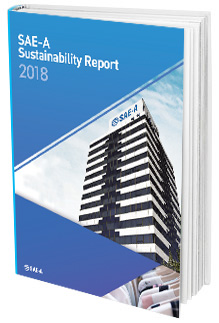
세아상역㈜은 2013년부터 세아 CSR Report(지속가능경영보고서)를 발간하고 있습니다. GRI Index를 바탕으로 회사 소개 및 경제적 성과, 혁신경영, 컴플라이언스, 사회공헌, 환경경영, 윤리경영, HR, QA, Lean 총 8가지 분야에 걸친 내용을 담고 있습니다. 한 해의 성과 뿐 아니라, Best practice를 위한 향후의 계획을 제시하며 지속가능경영을 위한 노력을 아끼지 않고 있습니다.

